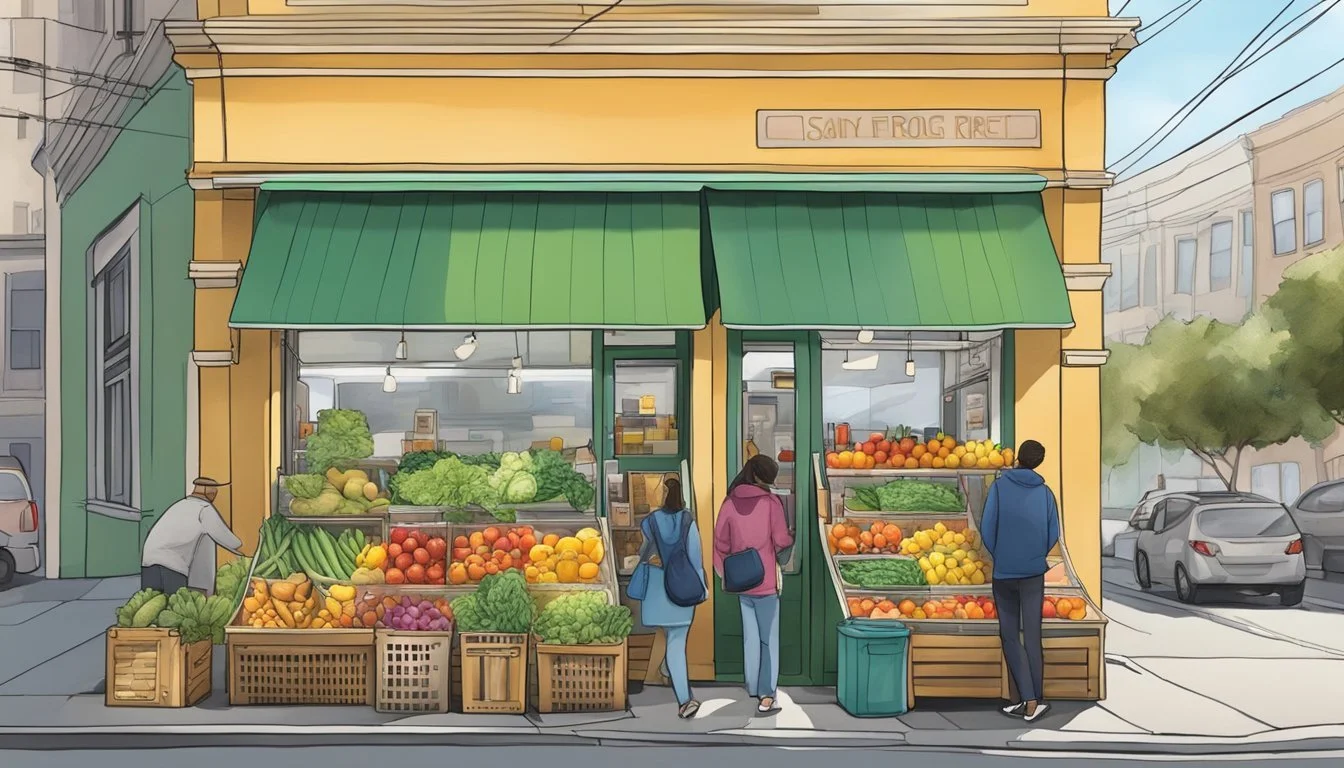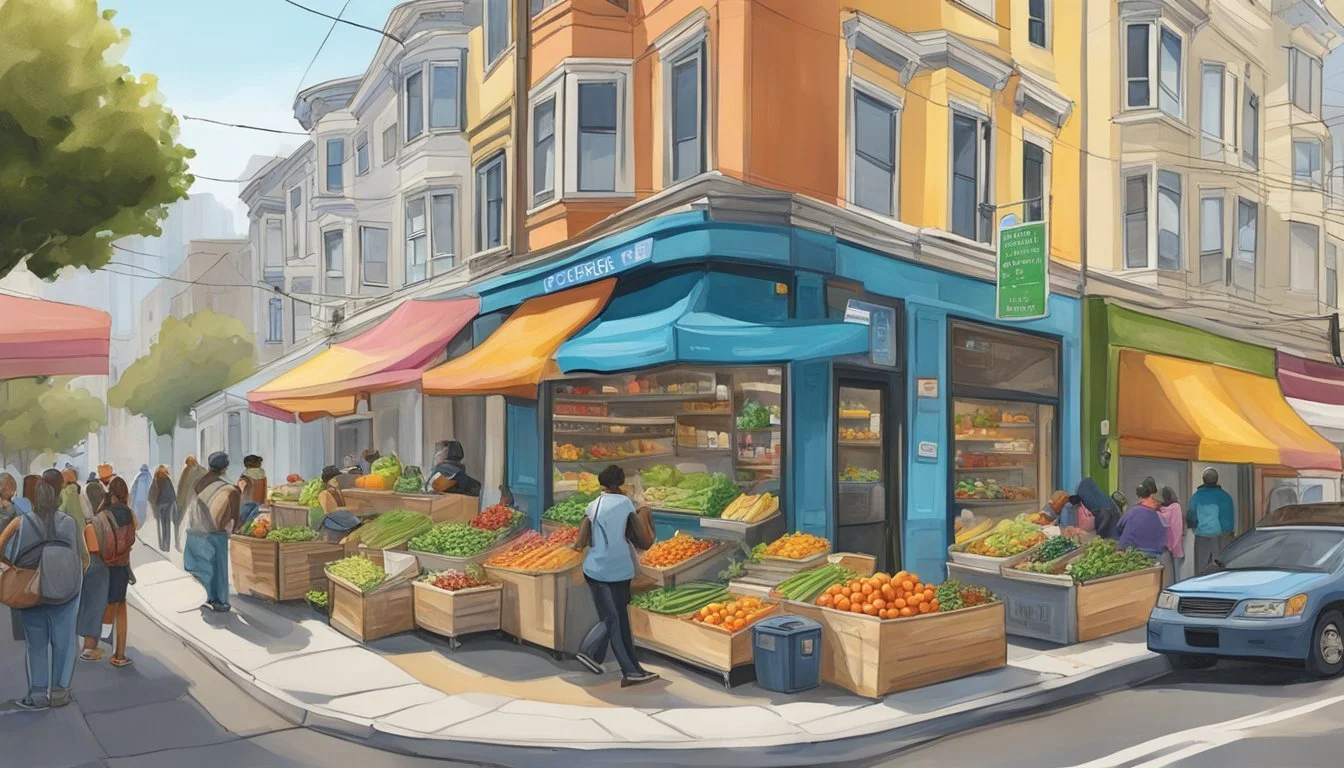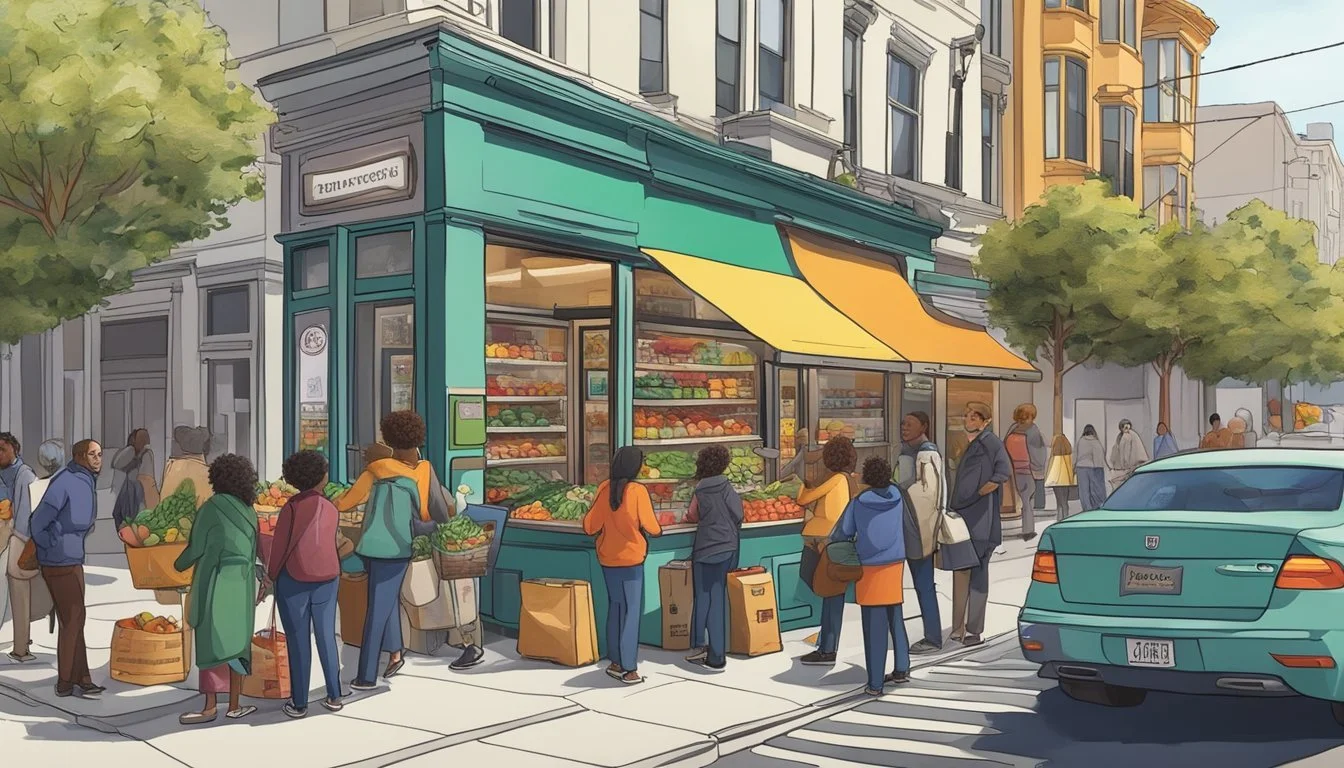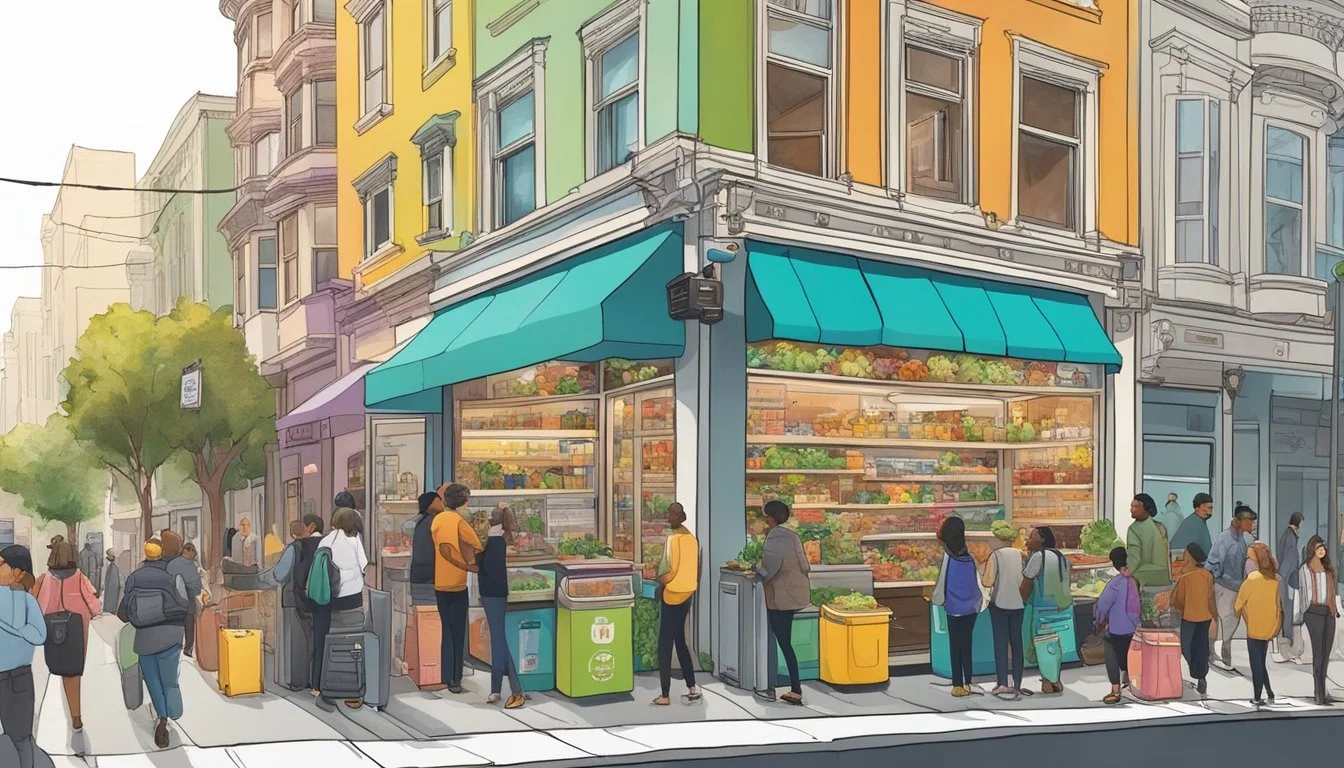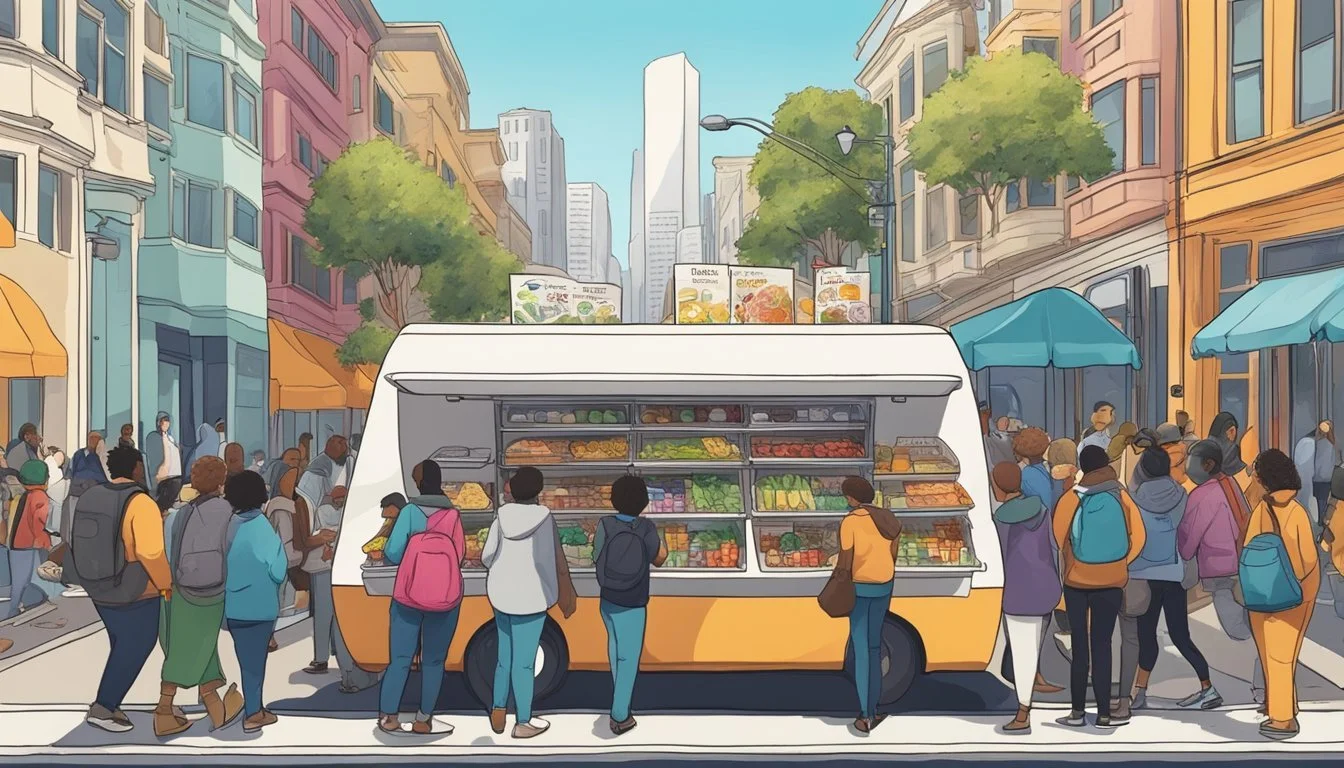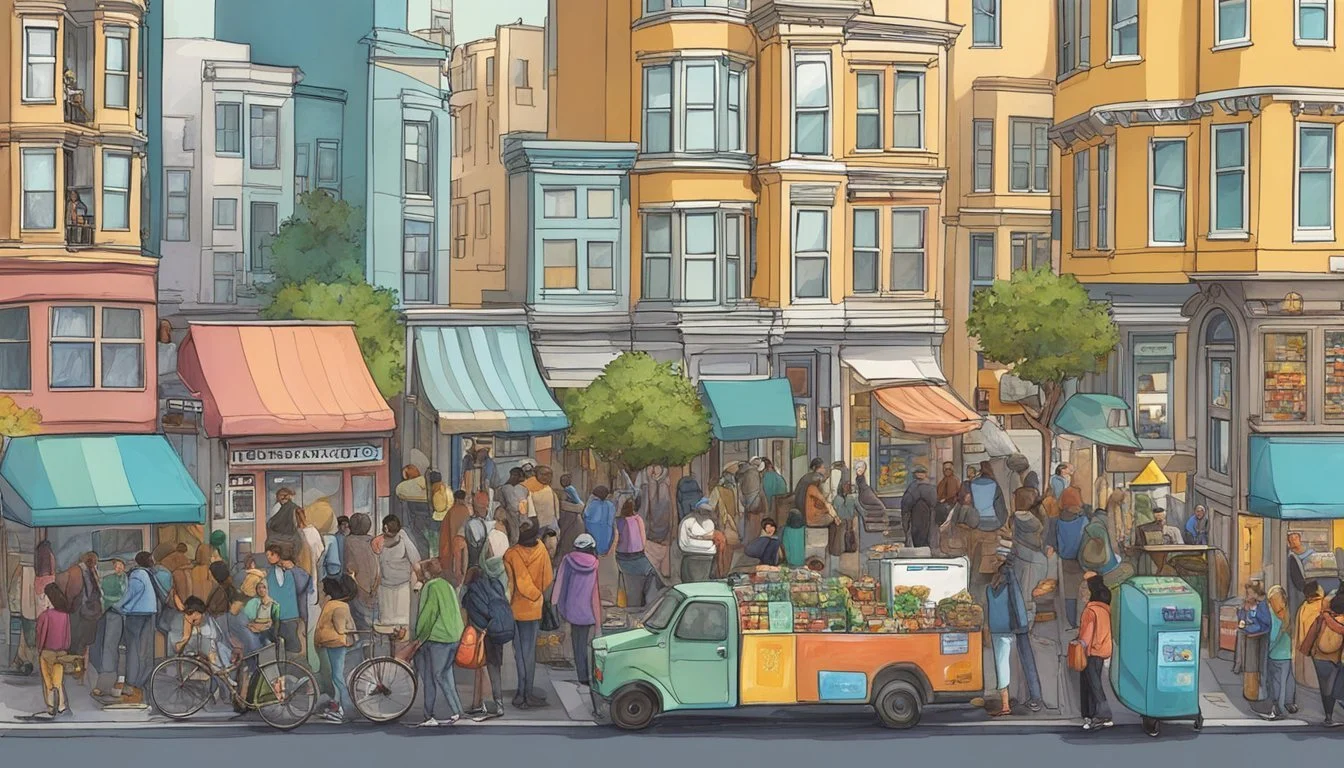San Francisco, CA Community Fridge
Tackling Food Insecurity Together
In San Francisco, a city celebrated for its innovation and community spirit, the community fridge movement has taken root as a response to food insecurity and food waste. These fridges provide a simple, yet effective platform for sharing surplus food, where residents can leave or take food as needed. Located in areas such as the Mission District, these refrigerators are accessible to everyone, making fresh food available to those who need it most. They operate under the principle of taking what you need and leaving what you can, epitomizing the spirit of communal support and sustainability.
One prominent location for a community fridge is outside Adobe Books at 3130 24th St in the vibrant Mission District. This initiative is sustained by a network of community volunteers who ensure the fridge is stocked and cleaned regularly. By offering culturally relevant food and essential items like diapers and infant formula, the fridge transcends merely being a food source; it becomes a cornerstone for nurturing community resilience.
The concept of community fridges in San Francisco is more than just an act of charity—it's a movement aimed at fostering local solidarity and combating the dual challenges of hunger and food waste. As these fridges become a familiar sight, they symbolize the city's collective effort to offer equal access to food, foster neighborly connections, and encourage a shared responsibility towards those in need. Through these communal resources, San Francisco leads by example, showcasing how urban communities can collaborate to support each other's well-being.
Understanding Community Fridges
Community fridges serve as innovative solutions to food insecurity and waste, providing free and easily accessible resources to local communities. In San Francisco, these community-driven refrigerators have become a vital part of the urban landscape.
Origins and Concept
Community fridges, also known as “freedges,” originated as a grassroots effort to combat food insecurity and reduce waste by offering a shared space for people to leave or take food. The concept relies on the simple premise that food should be freely available to those who need it. These refrigerators are typically placed in public spaces, making them accessible to everyone.
San Francisco's Initiative
San Francisco's embrace of community refrigerators has exemplified a strong commitment to addressing hunger within the city. One notable fridge, maintained in partnership with the SF Community Fridge organization, is located at Adobe Book Store at 3130 24th St, SF CA 94110. This fridge, along with others, is regularly stocked and cleaned by community volunteers, ensuring that it remains a reliable source of free food for residents.
Community Impact
Community refrigerators have proven to be lifelines for the neighborhoods they serve, especially during times of economic hardship. They provide:
Support: Aiding individuals facing food scarcity.
Sustainability: Reducing food waste by redistributing surplus food.
Solidarity: Strengthening community bonds as residents come together to manage the resources.
Their impact extends beyond providing nourishment; they foster a sense of community and shared responsibility.
San Francisco Community Fridge Locations
In San Francisco, the Community Fridge initiative aims to alleviate food insecurity by providing free, accessible food resources. These fridges are a testament to the community's commitment to mutual aid and food sharing.
Mission District Fridge
Adobe Books Location:
Address: 3130 24th St, San Francisco, CA 94110
The Mission District hosts a community fridge maintained through a partnership with Mission Meals Coalition (MMC) and volunteers. It's a key location designed to meet the immediate needs by offering a variety of food items.
Bay Area Network
SF Community Fridge:
This network features a series of refrigerators strategically placed around the city. It's part of a larger Bay Area initiative, promoting food sharing and sustainability at a neighborhood level.
Expansion to Oakland
Inspiration for San Francisco:
The success of the community fridge in Oakland, known as Town Fridge, has inspired similar efforts throughout the Bay Area, including San Francisco. This expansion reflects the growing need and community support for food sharing programs across neighboring cities.
Participation and Support
Participation and support are crucial for the sustainability of the San Francisco Community Fridge initiative. Volunteers, donors, and collaborative partners work together to maintain and operate the community refrigerator program.
How to Volunteer
Individuals interested in volunteering can contribute by stocking and cleaning the fridges. Volunteers are typically coordinated through community organizations and are essential in keeping the fridge at Adobe Book Store, located at 3130 24th St, San Francisco, CA 94110, well-maintained.
Donation Guidelines
Donations are vital to the Community Fridge’s success, with an emphasis on culturally relevant food items. Acceptable donations include:
Non-perishable food items: canned goods, pasta, rice
Perishable food items: fruits, vegetables, bread
Other essentials: diapers, infant formula, dog food
Prior to donating, members of the community should ensure that items are unopened and within their use-by dates. Donations can be placed directly into the community fridge.
Partnerships and Collaborations
The success of the community fridge in San Francisco rests on the partnerships and collaborations with local businesses and community groups. Adobe Book Store hosts a fridge location, contributing to its accessibility and reach within the community. Collaborative efforts are centered around addressing food insecurity and making essentials available to everyone, especially marginalized groups, avoiding barriers such as ID or proof of residency requirements for use.
Promotion and Awareness
Effective promotion and awareness strategies are crucial for the success of the SF Community Fridge initiative. They employ a variety of methods to inform and engage the public.
Social Media Outreach
The SF Community Fridge utilizes social media platforms, particularly Instagram, to reach a wider audience. They regularly post updates, share images of the stocked fridge, and highlight the contribution of volunteers. Their Instagram account serves as a hub for community engagement and information dissemination.
Instagram Strategy:
Posts feature actual fridge images to showcase availability.
Stories are used to highlight immediate needs or share volunteer experiences.
The use of relevant hashtags helps in reaching a broader, community-focused audience.
Local Events and Campaigns
SF Community Fridge often collaborates with local events and campaigns to raise awareness about food insecurity and to encourage community participation. These events serve as platforms to educate the public on how they can support the fridge, either through donations or volunteer work.
Campaign Highlights:
Volunteer Recruitment: Campaigns to attract individuals willing to dedicate time and energy.
Food Drives: Organized events to collect culturally relevant food items and other necessities.
Awareness Events: Initiatives focused on informing residents about the fridge's location and purpose.
Lists of upcoming local events are periodically shared on social media and through local community networks to keep the momentum of involvement high.
Food Security and Equity
Food security and equity in San Francisco are being actively addressed through community-driven initiatives, such as the establishment and support of community fridges. These fridges provide free and healthful food options to residents, directly combating food insecurity and promoting health equity among diverse communities.
Addressing Food Insecurity
Community fridges in San Francisco act as a critical resource in the fight against food insecurity. They are accessible to everyone, and they offer a variety of food items at no cost, which is particularly important for residents who may be facing economic challenges. San Francisco's public health department, along with other city agencies and community-based organizations, collaborates to collect and analyze data on food security. This collaboration helps to identify areas of need and inform the placement and stocking of these fridges.
Mission District Fridge: A notable example includes a fridge located in the Mission District at Adobe Books, known for being regularly stocked and maintained by community volunteers.
Culturally Relevant Contributions
It's crucial that assistance programs recognize the diverse cultural needs of the populations they serve. San Francisco’s community fridges often go beyond offering standard food items; they supply culturally relevant food and essential items reflective of the community's demographics.
Cultural Food Offerings: Such fridges often contain items that cater to the cultural diets of the communities, ensuring that the notion of food equity extends beyond mere access to include culturally-appropriate provisions.
Through these measures, San Francisco demonstrates a comprehensive and inclusive approach to enhancing food security and health equity, respecting the cultural diversity and human rights of its residents by providing nutritional and culturally appropriate food for all.
Operational Challenges
The San Francisco Community Fridge initiative faces various operational challenges, ranging from ensuring consistent maintenance and restocking to complying with health and safety regulations, all while efficiently managing resources amidst varying circumstances such as the COVID-19 pandemic.
Maintenance and Restocking
Community fridges like the one hosted by Adobe Bookstore requires diligent maintenance and restocking efforts. Volunteers ensure food and water are stocked regularly, which involves coordinating with donors and managing perishable items to avoid waste. The pandemic has increased the need for these resources, making consistent restocking vital.
Health and Safety Regulations
Adhering to health and safety regulations is paramount. With the threat of COVID-19, fridges must be cleaned and sanitized frequently to ensure community safety. Regular checks are necessary to maintain food quality and to comply with the city's health codes.
Resource Management
Efficient resource management is critical to the program's sustainability. During the pandemic, the surge in food insecurity has led to a higher demand for food assistance, challenging the program's capacity to maintain supplies. Resource management involves both the acquisition of food and the logistics of distribution and storage.
Community and Legal Considerations
The San Francisco Community Fridge initiative navigates a framework of mutual aid while attending to privacy, safety, and legal implications. These concerns intertwine with the human rights of access to food, especially for vulnerable populations such as undocumented individuals.
Privacy and Safety
Community fridges operate on the principle of anonymity, providing access to food without the need for personal information. The safety of individuals is paramount, necessitating regular maintenance and food safety checks. Privacy concerns are particularly salient for undocumented individuals, who may rely on these fridges but are wary of exposure. Protocols are established to ensure that no personal details are required or recorded during food pickup.
Mutual Aid and Human Rights
Mutual aid embodies solidarity by facilitating the exchange of support and resources within communities. This concept is at the heart of the community fridge movement, highlighting the human rights aspect of access to food. The fridges serve as a focal point for mutual aid, emphasizing that everyone has the right to basic necessities, regardless of their legal status or social standing. Legal questions regarding liability have been addressed to promote the continuity and expansion of these fridges, reassuring volunteers and organizers in their missions to support community well-being.
Funding and Sustainability
The San Francisco Community Fridge initiative is bolstered by the financial contributions and sustainability strategies that ensure its continued success. This dual focus on resources and environmental impact demonstrates a comprehensive approach to community support.
Financial Support
Organizations across San Francisco, including local food banks and nonprofits, have come together to provide financial backing for the Community Fridge program. These contributions fuel the program's ability to not only acquire and distribute food but also to maintain the infrastructure required for operation.
Funding Sources:
Community grants
Donations from local businesses
Support from environmental and hunger-relief agencies
Through this solid network of financial support, the program is able to remain a nourishing presence in the community.
Sustainability Efforts
The program's sustainability measures are geared towards minimizing waste and fostering an environmentally conscious operation. By implementing strategies such as energy-efficient appliances and promoting the use of locally sourced produce, the initiative underlines its commitment to a greener San Francisco.
Sustainability Strategies:
Use of energy-efficient refrigeration
Local food sourcing to reduce carbon footprint
Education on food waste prevention for donors and recipients
With these sustainability efforts, the San Francisco Community Fridge exemplifies an eco-friendly resource for those in need.
Innovations in Community Fridge Movement
The San Francisco Bay Area has embraced the community fridge movement as a means to address food insecurity and reduce waste. Innovative technologies and trends both locally and globally are bolstering the effectiveness and reach of initiatives like town fridge, freedge, and Cheetah's program.
Technology Integration
San Francisco's Cheetah, a company known for pioneering a community fridge program, incorporates technology to enhance food accessibility. By using digital platforms, they manage inventory and coordinate with donors and volunteers, ensuring that the community fridges are well-stocked and maintained. Apps and QR codes facilitate seamless sharing of information regarding locations and food availability in real-time, significantly improving user experience and efficiency.
The Freedge movement promotes food sharing through a network of community refrigerators and smart technology use. Their website provides a comprehensive map of fridge locations, helping individuals find and contribute to nearby fridges. The CSU Freedge initiative further expands this by equipping college campuses with community fridges, employing technology to engage students and staff in the fight against hunger.
National and Global Trends
The community fridge concept, with roots in local endeavors like San Francisco's town fridge, is witnessing a national and global upsurge. The initiative has been gaining momentum in cities across the U.S. and internationally. Concepts like (n)ice box have made a foray into colder climates, where insulated boxes prevent food from freezing, demonstrating adaptability to different environments.
Internationally, countries have begun to adopt this model, customizing it to fit cultural contexts and local needs. This expansion indicates a growing recognition of the role community fridges can play in fostering mutual aid and creating sustainable food systems. Global networking among these initiatives is leading to the sharing of best practices, expanding the positive impact of the community fridge movement.
Community Stories and Impact
Community fridges in San Francisco serve as more than just food distribution points; they embody the collective spirit and reflect the city's cultural heritage. They offer a glimpse into the lived experiences of residents and the enduring legacy of community support.
Testimonials and Interviews
Interviews with volunteers and beneficiaries reveal the direct impact of programs like the Mission Meals Coalition, operating the community fridge located at Adobe Book Store. Residents express gratitude, noting the fridge's role in alleviating food insecurity while fostering a sense of community. Volunteers often highlight the fulfillment they gain from supporting their neighbors, with local publications like Localish Inspire capturing these heartfelt stories through photography and narrative.
Key Volunteer Insights:
The joy in helping others
The importance of community solidarity
Legacy and Cultural Influence
The concept of a community fridge is deeply rooted in San Francisco's legacy of mutual aid and civic engagement. This initiative is a testament to the city's innovative and inclusive approach to addressing societal challenges. Cultural analysts observe how these fridges do more than feed the hungry; they serve as a beacon of togetherness, inspiring similar movements across the country.

